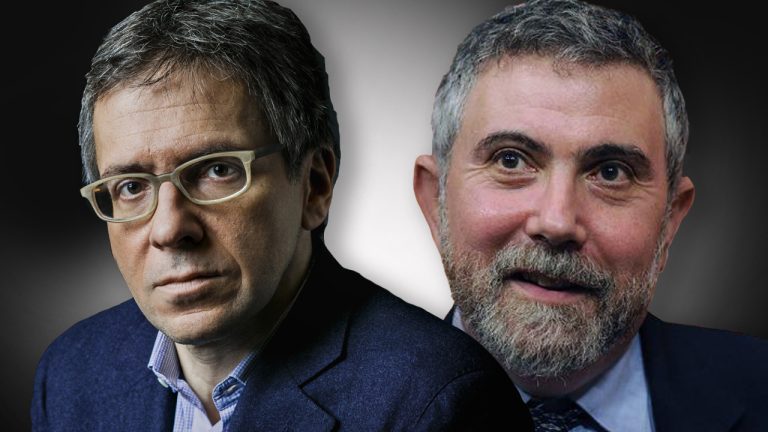
This year, there has been a flurry of news reports and opinion editorials discussing an alleged de-dollarization trend amid a wave of disclosures associated with the BRICS bloc. In a recent article, the American political scientist and author Ian Bremmer insisted that claims of the U.S. dollar dying are overblown. In addition to Bremmer’s comments, economist Paul Krugman also asserted in a recent op-ed that the greenback isn’t going away anytime soon and called some of the speculators “‘Weimarists,’ people who are always predicting hyperinflation.”
Political Scientist Ian Bremmer Insists Dollar Death Speculation Is Greatly Exaggerated
The subject of de-dollarization has been a topical discussion in 2023, as several market observers suspect the United States dollar could collapse in the near future. Many conversations and debates revolve around the BRICS nations (Brazil, Russia, India, China, and South Africa) and the alliances these countries have made. Several decisions have been made with help from members of the Organization of the Petroleum Exporting Countries (OPEC) to ditch the dollar in gas and oil settlements.
Moreover, worldwide Google Trends data shows that the term “de-dollarization” reached the highest score of 100 in terms of search interest during the week of April 2 to April 8, 2023. Google Trends data indicates that the subject began gaining momentum during the last week of March 2023. Prior to that, interest rose during the end of January 2023, but not nearly as high as the week of April 2-8 recorded by Google Trends’ 12-month metrics. Although interest has risen, the internet has been flooded with stories discussing the U.S. dollar’s theoretical doom and its removal from the throne of the world’s dominant reserve currency.
Amid these stories, Ian Bremmer, the founder of Eurasia Group and an author known for his knowledge of global political risk, has offered a different perspective on the alleged collapse of dollar dominance. Bremmer acknowledges the trend of de-dollarization headlines by highlighting eight different articles. The author says that these stories have “provided a fertile ground for gold bugs, crypto shills, hyperinflation truthers, techno-libertarians, anti-imperialists, and run-of-the-mill grifters to stoke fear about the dollar’s imminent death and its supposed catastrophic consequences for the United States and the global economy.”
Bremmer shows USD usage data from the Federal Reserve and insists that “rumors of the dollar’s death are greatly exaggerated.” He also asserts that, by most measures, the greenback “remains incontrovertibly dominant in global trade and finance.” The Eurasia Group founder stresses that the U.S. dollar possesses several “desirable features,” such as offering stability while also being “liquid, safe, and convertible.” However, Bremmer concedes that the greenback’s dominance could slip someday, as other dominant currencies have in the past. The author states:
None of this means that the dollar’s advantage can’t slip, of course. After all, every reserve currency that came before the dollar was dominant until the very moment it ceased to be.
Economist Paul Krugman Claims U.S. Dollar’s Role ‘Looks Pretty Secure’
The Eurasia Group founder is not the only one who feels that the dollar isn’t going to lose dominance anytime soon. Economist Paul Krugman also published an op-ed about the de-dollarization subject in The New York Times. Krugman takes aim at gold bug Peter Schiff and “Rich Dad, Poor Dad” author Robert Kiyosaki. The op-ed says that some of these individuals are “Weimarists,” insisting that they have been predicting Weimar Republic-like inflation in the United States. Krugman insists that the U.S. dollar’s dominance is not really at risk, and the “dollar’s role looks pretty secure.”
“The dollar has three big advantages,” the Nobel laureate said. “One is incumbency: Since everyone is already using dollars, it would take exceptional circumstances to get them to switch. A second is that U.S. financial markets are open: Unlike China, we don’t impose controls on people trying to move money into or out of the country. The third is the rule of law,” Krugman added.
Concluding his “subscriber-only newsletter,” Krugman says there’s “one major caveat.” He believes there’s a possibility that the U.S. could default on debt because the Republican-controlled House refuses to raise the debt ceiling. In terms of the political spectrum, Krugman is a left-leaning Democrat and is rated “most liberal” by allsides.com. “Who will trust the currency of a nation that appears to have politically lost its mind?” Krugman asks in his NYT op-ed. “If that happens, the threat to the dollar’s reserve-currency status will be the least of our problems.”
What do you think the future holds for the U.S. dollar as the world’s dominant reserve currency, and how might the trend of de-dollarization impact the global economy? Share your thoughts about this subject in the comments section below.
from Bitcoin News https://ift.tt/nypShCN
via NEWS BTC

Post a Comment